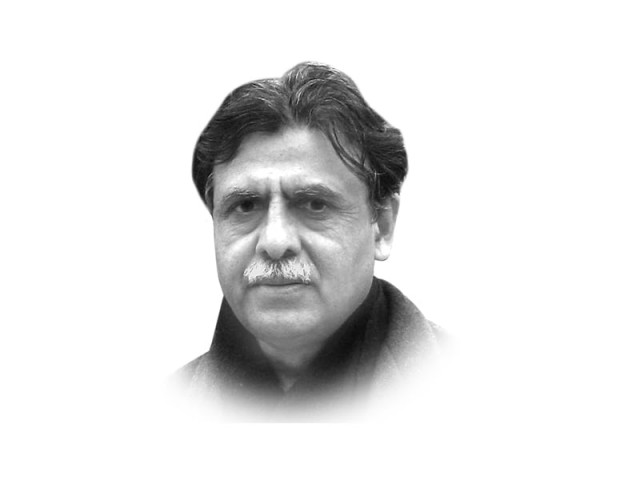Pakistan at a crossroads
Any role by Pakistan in a situation where two Muslim countries flexing their muscles, needs deep & detached analysis

The writer is an author, a public policy analyst and a former federal secretary. He teaches at the Lahore University of Management Sciences
The advance of the Islamic State (IS) in Syria and Iraq has been a disturbing phenomenon. The IS has been targeting areas from Aleppo in Syria to Diyala in Iraq despite US air strikes and resistance by Iraqi and Syrian forces and their sympathisers. Saudi concerns regarding the IS advances are understandable considering the group’s ultimate agenda of making inroads well beyond its present domain with an eye on the Saudi kingdom. This phenomenon needs to be taken seriously for two reasons. Radical jihadist movements were so far focusing on intimidating and traumatising their victims. The IS has now gone a few steps ahead in laying claims on the capture and consolidation of territory. Physical space has only been used as a launching pad for its movement. The current staging ground also has proximity to Europe from where jihadist recruits are pouring into the areas controlled by the IS. Radicalised Muslim youth and converts, who are targets of intimidation by the far right in Europe, are finding natural alignment with the IS phenomenon. The Saudi wish for a broader alliance in the face of these developments should be seen in this context.
The concerns of the Saudi leadership does not spring from the danger posed by the IS alone. A resurgent Iran, in close concert with the Shia populations in Yemen, Syria, Iraq and some key Gulf states, is also causing it anxious moments. The emergence of this phenomenon is being perceived by Saudi Arabia as a threat. Despite US sanctions and a close watch on Iran’s nuclear programme, convulsions in the region have given Iran an opportunity to extend its influence and it has emerged as a counter to Saudi Arabia and its allies in the region.
The Saudi wariness is not on account of events in Syria and Iraq alone; its eastern border adjoining Yemen is equally fraught with uncertainties. The fractious struggle in Yemen has a sectarian and faith-based bent represented by the Shia Houthis who have driven out a pro-Saudi government from the capital Saana. The ideological stance of the Houthis is in direct clash with the interpretation of faith as it is practised in Saudi Arabia. The Houthis also represent an anti-US and anti-Israel stance. They seem to be natural allies of Iran in the larger framework of the ongoing power struggle in the region. The Saudi eastern province houses a sizeable Shia population and adjoins the Houthi-dominated northern Yemen. Shias constitute nearly 20 per cent of the population of the kingdom. The region where they are most concentrated is known for its rich oil reserves and refineries, and it is also a hub for the chemical industry. The Saudi worries, therefore, are not merely on account of the rise of the IS. It is also the situation that is developing close to the porous border with Yemen, which may well bring in the element of instability within the kingdom. This is the broad framework within which some role by Pakistan is being sought. How Pakistan responds to the specifics, is yet to be seen.
Any role by Pakistan in a situation where we have two Muslim countries flexing their muscles, one of them being our immediate neighbour, needs deep and detached analysis. With all our borders in a state of unease, we cannot afford to open another front at this stage. Pakistan is already passing through a decisive phase in the war against terror, which now requires internal cohesiveness with least distractions. We cannot act in a way that invites more cleavages to develop within our society knowing the delicate sectarian mix in the country. We also need to understand that the days of rent-seeking are over and simmering issues require a far more structured response.
Iran has already been engaged by the West through a structured framework on its nuclear programme. There is need to extend the scope of this framework in the coming years to douse the situation in the region. Pakistan, in that context, could play a productive role in bringing the two sides together. We did something like this before during the Rabat summit in 1969 and at the Islamic summit in 1974. We again need to gear our thinking on these lines for stability and peace in the region. There are indications that the Iranians would welcome such an initiative as they are aiming to end their isolation and be an active partner in global trade and business. Likewise, countries in the region, including Saudi Arabia, need to take an introspective look at their systems, which now call for inclusive development, and social and political reforms. With growing awareness in this age of the media, medieval approaches to solve long-standing problems will not help anyone.
Published in The Express Tribune, March 24th, 2015.
Like Opinion & Editorial on Facebook, follow @ETOpEd on Twitter to receive all updates on all our daily pieces.
















COMMENTS
Comments are moderated and generally will be posted if they are on-topic and not abusive.
For more information, please see our Comments FAQ